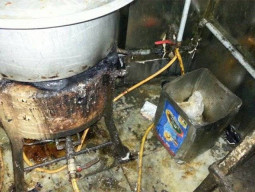
Concerns that the government has not done much for preparing millions of people for a flood in the province dominated a workshop held in Karachi on Thursday.
Representatives from different districts, independent experts and civil society members said that the government does not have a serious attitude, and that its 2011 strategy of flood relief and recovery was defective.
The sense of urgency came across at a workshop on ‘Success and Challenges in Flood Advocacy Strategies in Sindh’ organised by the Participatory Development Initiatives (PDI) in collaboration with Oxfam.
Representatives said that families had been denied the right of relief and recovery support, even though the government had recognised that their areas had been affected by the 2011 floods.
Non-governmental organisation (NGO) representatives said that the government had mismanaged relief activities. Those affected were not registered properly and relief was provided to them courtesy influential MNAs and MPAs. They claimed that almost 30 per cent of the flood-hit area in Sindh was still inundated after eight months.
Noor Bajeer of the National Humanitarian Network and Sikandar Brohi of Peoples Accountability on Flood also criticised the government for using schools as relief camps and warned it against repeating this move. “The government is still thinking about using schools as camps for possible floods in 2012. It would further ruin the education system. The government must prepare an alternative mechanism for housing flood striken people,” he said.
PDI’s Rafiq Channa accused the government of politicising humanitarian aid. “Thousands of people stayed outside banks for several days and spent nights for getting money through Pakistan Cards. If such disasters continue to occur in Sindh, I fear that the situation will be more vulnerable than in Somalia,” he said.
NGOs were criticised for not providing relief across the board and hiring staff from outside the province. “Hundreds of people in Sindh are highly trained and know how to deal with certain situations,” Bajeed said.
Salman Safdar of the United Nations Office for the Coordination of Humanitarian Affairs (UNOCHA) said that it is difficult for international organisations to visit certain areas when the roads are blocked. “We need to train communities not to block roads because it portrays to foreigners that there is a law and order situation,” he said.
A number of resolutions were passed by the participants, calling on the government to initiate disaster preparedness and contingency planning to save millions of vulnerable communities from possible flooding in the province this year. They asked that floodwater be drained and encroachments put up by influential people in Sindh be removed. Among other demands, they asked for improvement in early warning systems and data collection, an end to politicised relief work and for the use of local human resource by international aid organisations.
Published in The Express Tribune, April 27th, 2012.
COMMENTS (1)
Comments are moderated and generally will be posted if they are on-topic and not abusive.
For more information, please see our Comments FAQ



1732626034-0/BeFunky-collage-(92)1732626034-0-165x106.webp)













As the monsoon season nears, Sindh remains unprepared
And then blame India for the floods.